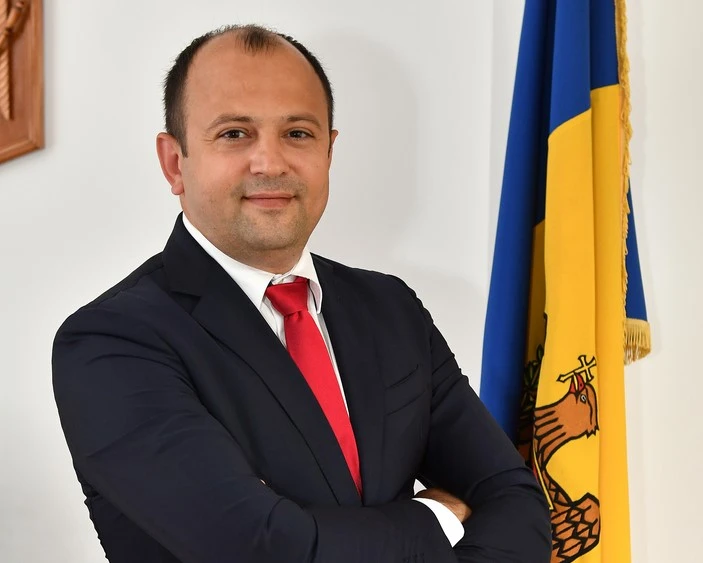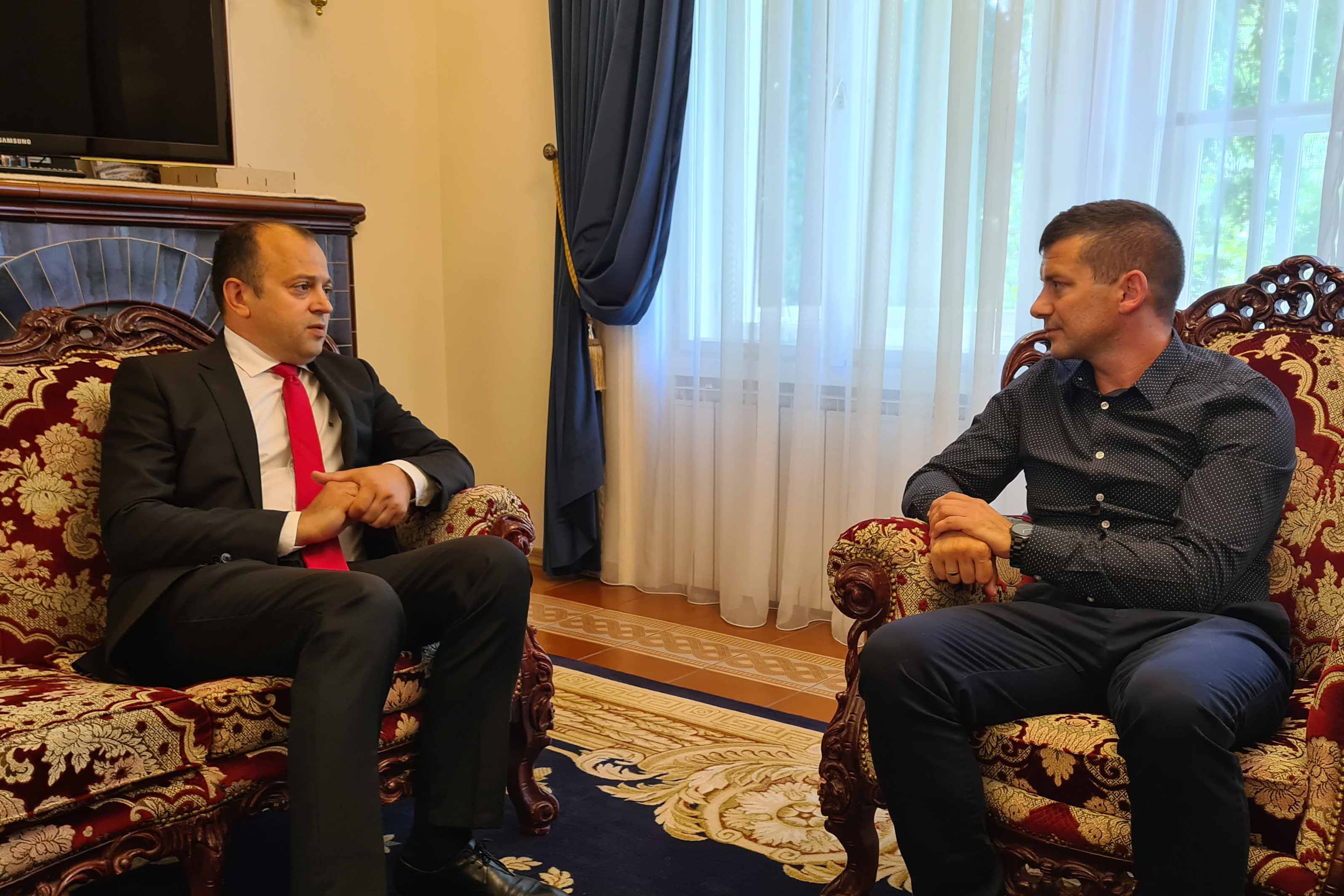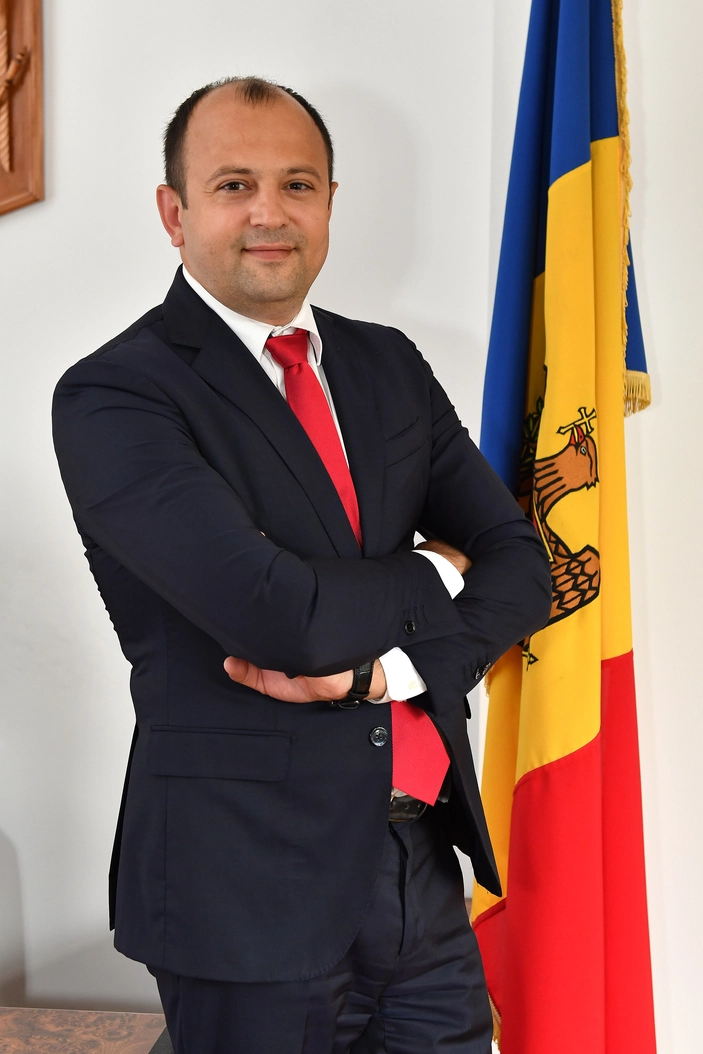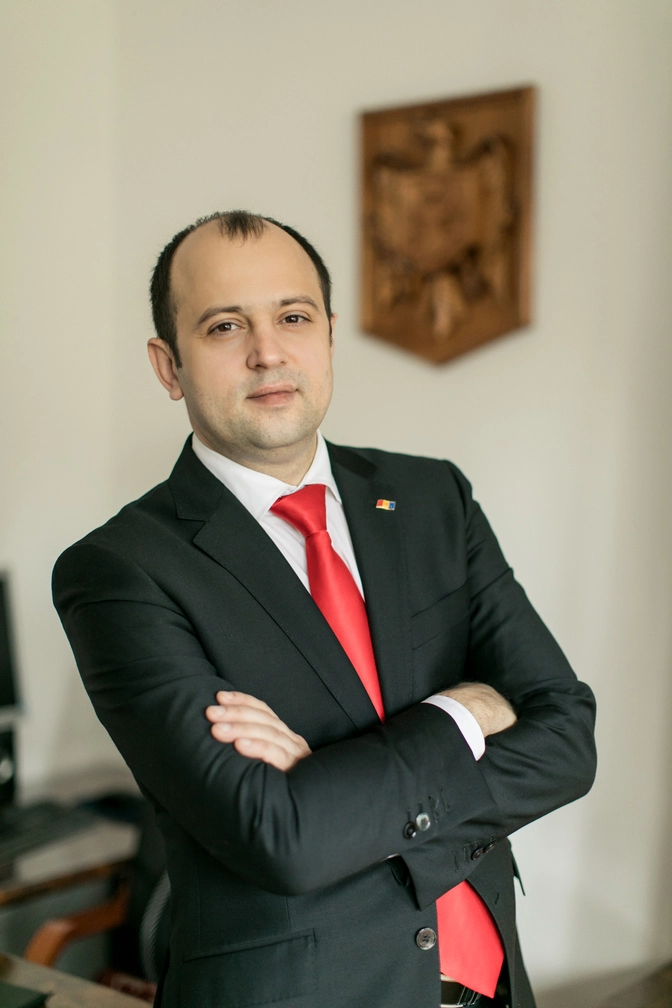Moldovan ambassador: Russian aggression is highly destabilizing for Moldova

We interviewed Oleg Tulea, the Moldovan ambassador to Budapest, who has been serving in the Hungarian capital since 2016. He talked about the severe dangers of the ongoing Russian invasion in Ukraine created for his country, why he recommends Moldovan touritst to visit Hungary, what his favourite three Hungarian cities are, and why wine is the pride of the Moldovan people.
DNH: Had you visited Hungary in the past before you were appointed ambassador to Budapest? What was your first thought when you were told that the Hungarian capital would provide the setting for the next important chapter in your life?
I visited Hungary several times before being posted in 2016, mainly in the capacity of Member of the Parliament of the Republic of Moldova and part of the Moldovan – Hungarian Friendship Group in our legislative body. I visited Hungary privately as well, being always fascinated by the marvelous Budapest, the pearl of Danube River. It is still fun to notice that places that you visit as a tourist become part of your usual environment while living and working for a longer period.

DNH: Tell us a little about yourself and your previous professional experience. Do you work as a diplomat in the traditional sense, or you rather consider yourself a career diplomat?
My career as a diplomat started in 2016 here in Hungary. Serving in the Parliament and Government before, I took this challenge to start a new page in my professional career. I was appointed as Ambassador to Hungary, but also as a non-resident Ambassador to Republic of Croatia, Republic of Slovenia, Bosnia and Herzegovina and the Permanent Representative of the Republic of Moldova to the Danube Commission.
What we could see from the beginning when coming to Budapest is that relations between Hungary and Moldova are really very good and open and I pledged to make every effort so that my work here renders tangible results. The fact that Republic of Moldova and Hungary are bonded with a Strategic Partnership since 2020 I take as a proof of our Embassy team’s efforts. For nine months in 2020, I had the honor to serve in the capacity of the Minister of Foreign Affairs and European integration of the Republic of Moldova and in November 2020, I was posted back to Budapest for a new mandate as Ambassador.

DNH: Moldova is only 1000 kilometers from Hungary; hence, we are very close. What kind of Hungarian products can you find in Moldova? And what Moldovan products are available here for Hungarian customers?
We are close indeed to each other, yet to discover each other in terms of trade and economy. Our bilateral trade is constantly growing, still it will be hard for Hungarian or Moldovan consumers to link one product with the country of origin. The biggest share in our bilateral trade are industrial goods and pharmaceuticals. The volume of foreign trade of the Republic of Moldova with Hungary in 2021 recorded the amount of 163.40 million. USD.
In 2021 Republic of Moldova’s export of goods to Hungary recorded the amount of 41.80 million USD (increased 1.5 times compared to 2020). Hungary’s exports to the Republic of Moldova in 2021 recorded the amount of 121.59 mln. USD (+21% compared to 2020).
As you see the trend is positive which means that there is a lot of untapped potential in our economic and trade cooperation.
An element that is certainly helping this process is of course the successful activity of the OTP Bank on the financial-banking market of the Republic of Moldova, which gives greater confidence to Hungarian businessmen to invest and start business in the Republic of Moldova. The pharmaceutical company Gedeon Richter and Vitafort, specialized in animal feed supply are also important reference names.
And even if the agriculture is strong in both countries, we witness an increased interest for our agricultural products on Hungarian market. Just recently, several producers of fresh fruit and vegetables launched exports to Hungary from the Republic of Moldova.

DNH: In our previous conversation, you mentioned that Moldova was an IT superpower. What exactly did you mean by that? And how did your country achieve this enviable status?
The IT industry is undoubtedly the most dynamic and one of the fastest-growing economic sectors in Moldova having all the necessary ingredients for a rapid and impactful digital transformation: advanced infrastructure, developed ICT private sector, authorities’ commitment focused on digital transformation, as well as a well-prepared society for accepting and using digitalization.
It offers the highest salaries, employs the youth and the creative people, digitally transforms the entire society, and is a Government top priority. The information and communications technology industry has become one of the locomotives of economic growth in the Republic of Moldova in recent years.
Moldovan IT companies successfully compete with European companies in such market segments as development and support of software, mobile applications, network and database administration and export about 80 percent of their total production. Major Moldovan partners in this area are the United States, the UK, France, Germany, the Netherlands and Romania.
And yes, already for several consecutive years, the Republic of Moldova exports more ICT products than wines.
Moldova has a strong pool of current and emerging ICT professionals: annually over 2,000 students graduate with a degree in ICT, engineering, modern technologies, and a variety of other technical fields. A number of initiatives already support mainstreaming digital tools at all levels of the educational system, such as: Tekwill in every school, Future Classroom initiative, National Program for Digital Literacy among Teaching Staff, as well as the online educational platforms.
Most Moldovan IT specialists speak at least one foreign language in addition to Romanian and Russian. Salaries remain competitive and some ICT companies struggle to retain skilled employees seeking higher paying jobs in the region. It is estimated that the current workforce size of Moldova’s ICT Industry is almost 30,500 specialists. Well over 80% are technical specialists, including software engineers, business analysts, QAs and testers, developers, product and project managers. The employee recruitment rate in IT companies in Moldova is 29.1%, according to the Paywell study, performed by PwC Moldova in 2021, which is more competitive due to the increased number of companies who chose to open a business in Moldova
Our country is a competitive alternative to “traditional” IT destinations, especially as a location for software development or call centers. Moldova has one of the best—and cheapest—Internet connections in the world. Mobile network operators offer excellent internet connections.
It is important to emphasize at the same time that a special law on Virtual IT Parks and the creation of IT Park Moldova is one of the main reasons behind such fast growth. It was created in 2017 at the initiative of the government. As expected, the incentives offered by the Moldova Innovation Technology Park gave a significant boost to the ICT sector development. This virtual structure today unites 1,200 resident firms, all of which pay a flat income tax of only 7% (applied 7% single tax on turnover which covers a set of social taxes). Moldova IT Park has been recognized by the International Telecommunication Union (ITU) as one of the best global practices in promoting and developing the IT ecosystem. The award was presented at ITU Telecom World 2019 which took place in Budapest, Hungary.
DNH: Your country is bordered by the “Transnistrian Republic” to the east. How would you describe your current relationship? How should one imagine this “state” which is officially part of Moldova, receives support from Russia but is not recognized by any UN member countries?
The unresolved conflict in the Transnistrian region of the Republic of Moldova remains the main challenge to the sovereignty, territorial integrity, and security of the Republic of Moldova. The Moldovan Government is firmly determined to identify, with the help of its international partners, a peaceful, comprehensive, and sustainable solution for the conflict, based on respect for the sovereignty and territorial integrity of the Republic of Moldova within its internationally recognized borders.
Certainly, the war in Ukraine has affected the prospects of the Transnistrian settlement process. Pre-war plans to hold a 5+2 round in May and the informal conference in Bavaria in July were cancelled. Our goal is to keep the 5+2 format “alive”, because it already includes all relevant actors for the conflict resolution process. The next 5+2 meeting will probably take place after the resolution of the conflict in Ukraine.
I wish to emphasize once again, the Republic of Moldova wants to solve the Transnistrian conflict through peaceful dialogue and diplomacy.
What we see is that also the absolute majority of citizens in the Transnistrian region doesn’t want to live in a war zone and wants peace, the companies from the region export their good on EU market mainly.
But with the current developments in the neighboring Ukraine, the activity of those forces that want to fuel destabilization is becoming more visible.
On the other hand, the war in Ukraine has created the premises for a more intense interaction between Chisinau and Tiraspol using all existing negotiation formats to identify viable solutions to the most urgent problems faced by the residents on both banks of the Dniester. The competent authorities of the Republic of Moldova do not currently notice imminent military and security risks from the Tiraspol structures, but at the same time we, of course, are carefully monitoring the developments in the region.
DNH: The frontline of the Ukrainian war is getting closer and closer to Moldova. Odessa, just 60 kilometres from your border, has already been hit by several Russian missile attacks. How do you assess your current situation?
The Russian Federation’s military aggression against Ukraine is the biggest security crisis in Europe in recent decades. From the first day, the Republic of Moldova firmly condemned this premeditated, unprovoked, unjustified, and illegal aggression which is highly destabilizing for Moldova. The war in Ukraine has generated manifold challenges and unprecedented risks for the Republic of Moldova. The war has significantly worsened the socio-economic situation in the Republic of Moldova. Over 500.000 refugees fleeing neighboring Ukraine entered Moldova; around 75,000 are remaining, and about half of them are under-aged children. This has put significant financial and administrative burden on the government.
But this is not merely a humanitarian and economic crisis for Moldova, it is also a security crisis. The war has highlighted Moldova’s national security fragility and the need to enhance its resilience toward the various security challenges with respect to the neutrality principle which is enshrined in our Constitution. Shall there be military advancements in south of Ukraine, Moldova’s survival as independent and sovereign state will be in peril. This is a very difficult position not just for Moldova but for any other country that relies on the rules-based international order.
It’s a hypothetical scenario for now, but if the military actions move further in the south-west of Ukraine and towards Odessa, then of course, we have reasons for concern, especially if we consider the illegally stationed troops on the territory of our country – namely the Operational Group of Russian Forces in Transnistrian region which comprise about 1,500 people (the OGRF guards the weapons depots in Cobasna village).
DNH: The Moldovan people are almost entirely dependent on Russian gas. How can you reduce this dependence?
Moldova’s energy policy focuses on improving integration in regional markets, strengthening energy security, improving compliance with EU directives, increasing electricity generation capacity, and promoting energy efficiency and renewable energy. The significant change in the country’s energy sector is undergoing, including institutional, market-related and physical development, are part of integration into the European energy market.
After Ukraine, Moldova is the most affected country by this war. The country is largely dependent on energy imports from Russia and receives all its gas supplies from Gazprom. At the same time, the Republic of Moldova does not have natural gas storage capacities, natural gas can only be stored in neighboring states. Although there is currently a contract for the supply of natural gas for a term of five years between Gazprom and Moldovagaz, there is a risk that natural gas deliveries can be limited or stopped, at any time. At the same time, there is a risk of a lack of safe and competitive (alternative) sources of natural gas import, in the sense of purchasing them at reasonable prices and transporting them to the Republic of Moldova (including through the Trans-Balkan gas pipeline in reverse flow).
Notwithstanding the current situation, Moldova makes efforts to reduce dependence and the costs for energy imports, apply a compensation mechanism, enhance energy efficiency and reduce the gas consumption in all sectors.
The main energy security-related projects are the Iasi-Ungheni-Chisinau gas interconnection pipeline with Romania, and Moldova’s integration into the EU electricity market through interconnections with the Romanian electricity network.
The government also plans to diversify the energy mix with more renewable energy which require significant investment in the medium and long term and the progress will depend on the country’s ability to attract funds. On the other hand, the government is taking measures to reduce the consumption of natural gas by using alternative fuels where this is possible. Measures are also being taken to reduce the vulnerability of consumers, by creating the energy vulnerability fund, which will also provide financing for energy saving projects.
DNH: You aim to raise awareness of Moldova’s tourist and commercial values through a number of events. What are the most important upcoming events organised by the Embassy?
In September the Embassy is planning a tourism promotion event in Partnership with Moldova Invest Agency and the National Inbound and Domestic Tourism Association of Moldova with the participation of Hungarian travel operators. Now with opening of the direct flight between Budapest and Chisinau, more and more Moldovan tourists are visiting Hungary, especially the thermal spa hotels and by organizing such events we would like to contribute to the growth of the number of Hungarian tourists visiting our beautiful small, but with a Big Heart country.
DNH: If you had to name three Hungarian cities you would like to live in, which would they be? Moldova is famous for its wine. How do you like Hungarian wine? Which Hungarian wine region is similar to that of Moldova?
Budapest would be my first choice of course. I am visiting quite often Szentendre and Gödöllő . Székesfehérvár and Győr is also very close to my heart. It is hard to choose just three names. I keep good memories of many other cities and villages, rich in culture, history and architecture.
I am very proud that this year the Moldovan Fautor Negre 2017 received the highest jury score in the red wine category among a total of 5084 red wines from around the world at Concours Mondial de Bruxelles, but I also know that a Hungarian wine – CASSIOPEIA MERLOT 2015 by Jamertal – has also received received the Grand Gold Medal at the same contest in 2021. I am impressed by the quality of Hungarian wines and I respect the fact that Hungarian consumers prefer local wine to renowned foreign wines. Here I become a huge fan of Tokaj wine and its fascinating story, but also learned about local sorts of grapes like Turan or Csókaszőlő for example which can hardly be tasted elsewhere in the world.
I believe that Villany region would be similar to the south or south-east wine regions in Republic of Moldova.
DNH: Finally, what advice or recommendation would you give to tourists who plan to visit Moldova?
In the last edition of its onboard magazine, Wizz Air describes Moldova as the next big destination for wine and food in Eastern Europe. Wine is the pride of the Moldovan people and it makes this country special! Every year, in October, the National Wine Day is celebrated in the central square of the capital. The best winemakers welcome the guests and surprise them with their various wines. HERE you can find them.
The national Moldovan cuisine will please your tastes with its sincere simplicity and richness. A savory soup called Zeamă, cooked with homemade noodles and Mămăliga – a hard porridge made from cornmeal, which is being cut with a thread. Plăcinte are prepared from a thin dough with a variety of fillings: cabbage, cottage cheese, apple, pumpkin and cherries.
But there are plenty of other things you can do in my country beside visiting the world’s largest underground cellar or treating yourself with incredible food – hiking through the secular forests, exploring Moldova by kayak, sailing on the Nistru and Prut, photo sessions in lavender fields, sleeping in barrels, running or even bike rides through the galleries of the world’s largest winery, climbing caves, the experience of witnessing the “gathering” of thousands of pelicans on Lake Beleu, visits to cave monasteries and medieval fortresses will bring charm to any chosen tourist itinerary.
Visiting the unique historical complex of Old Orhei, seeing the cave monasteries and ancient hermitage is a MUST. No tourist left our country without visiting this picturesque valley. And, of course – the mighty forests Codrii, situated in the centre of our country.
“Hospitality” has always been Moldovans’ middle name and forms such an important part of our culture. Although Moldova is still not very well known yet, we’ve been working hard these last few years to spread the word on this. As a result, tourism in Moldova is thriving as more travelers are visiting to experience some of this authentic hospitality themselves, whether in the Moldovan countryside, along one of our famous wine routes, or in the capital city, Chisinau.
If you would like to bring from your trips not only magnets, but also unforgettable impressions and unique stories for your friends, my country will sincerely surprise Hungarian tourists.
Music concerts, festivals and marathons, every year, inspire the citizens of our country to join the events. The festival of ethnic musicians from around the world “Ethno Jazz”, the “DescOpera” festival, the “Underland Fest”, the festival of colors, as well as marathons, organized in wine cellars, leave expressive memories.
After all, this is exactly what everyone is looking for in a new journey. All roads to our hospitable country are open. You can get to Moldova by plane – to the airport of the capital, Chisinau, by car, or by train.
DNH: And what message do you have for Moldovan tourists who would like to visit Hungary?
To stay safe, to respect the local rules and not to forget that the Embassy of the Republic of Moldova in Budapest is always ready to assist them.
Source:







